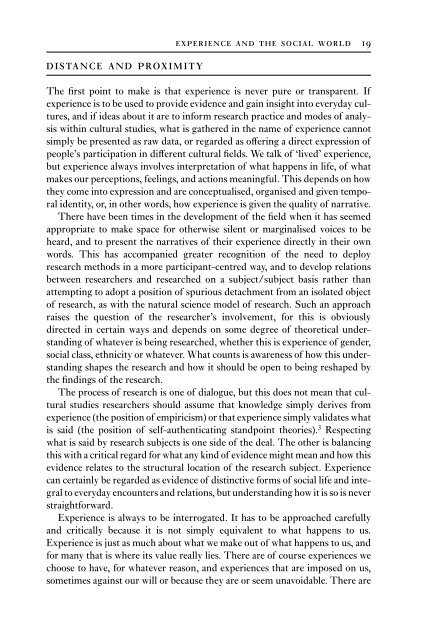Research Methods for Cultural Studies
Research Methods for Cultural Studies
Research Methods for Cultural Studies
Create successful ePaper yourself
Turn your PDF publications into a flip-book with our unique Google optimized e-Paper software.
distance and proximity<br />
experience and the social world 19<br />
The first point to make is that experience is never pure or transparent. If<br />
experience is to be used to provide evidence and gain insight into everyday cultures,<br />
and if ideas about it are to in<strong>for</strong>m research practice and modes of analysis<br />
within cultural studies, what is gathered in the name of experience cannot<br />
simply be presented as raw data, or regarded as offering a direct expression of<br />
people’s participation in different cultural fields. We talk of ‘lived’ experience,<br />
but experience always involves interpretation of what happens in life, of what<br />
makes our perceptions, feelings, and actions meaningful. This depends on how<br />
they come into expression and are conceptualised, organised and given temporal<br />
identity, or, in other words, how experience is given the quality of narrative.<br />
There have been times in the development of the field when it has seemed<br />
appropriate to make space <strong>for</strong> otherwise silent or marginalised voices to be<br />
heard, and to present the narratives of their experience directly in their own<br />
words. This has accompanied greater recognition of the need to deploy<br />
research methods in a more participant-centred way, and to develop relations<br />
between researchers and researched on a subject/subject basis rather than<br />
attempting to adopt a position of spurious detachment from an isolated object<br />
of research, as with the natural science model of research. Such an approach<br />
raises the question of the researcher’s involvement, <strong>for</strong> this is obviously<br />
directed in certain ways and depends on some degree of theoretical understanding<br />
of whatever is being researched, whether this is experience of gender,<br />
social class, ethnicity or whatever. What counts is awareness of how this understanding<br />
shapes the research and how it should be open to being reshaped by<br />
the findings of the research.<br />
The process of research is one of dialogue, but this does not mean that cultural<br />
studies researchers should assume that knowledge simply derives from<br />
experience (the position of empiricism) or that experience simply validates what<br />
is said (the position of self-authenticating standpoint theories). 3 Respecting<br />
what is said by research subjects is one side of the deal. The other is balancing<br />
this with a critical regard <strong>for</strong> what any kind of evidence might mean and how this<br />
evidence relates to the structural location of the research subject. Experience<br />
can certainly be regarded as evidence of distinctive <strong>for</strong>ms of social life and integral<br />
to everyday encounters and relations, but understanding how it is so is never<br />
straight<strong>for</strong>ward.<br />
Experience is always to be interrogated. It has to be approached carefully<br />
and critically because it is not simply equivalent to what happens to us.<br />
Experience is just as much about what we make out of what happens to us, and<br />
<strong>for</strong> many that is where its value really lies. There are of course experiences we<br />
choose to have, <strong>for</strong> whatever reason, and experiences that are imposed on us,<br />
sometimes against our will or because they are or seem unavoidable. There are


